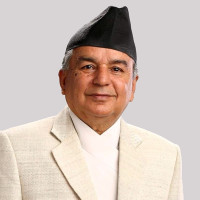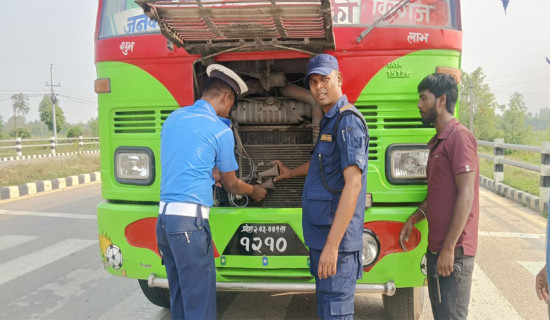- Sunday, 19 May 2024
Credible Media: Bulwark For Press Freedom
The first week of May has two notable dates for journalists in Nepal. The first is May 3rd when Nepali scribes join their international fraternity to observe the World Press Freedom Day. The second date is May 6th which is celebrated nationally as the National Journalism Day. This day has been officially chosen to mark the first appearance of Nepal’s first newspaper – the Gorkhapatra – in 1901. First the national context. Since the day designated as a celebratory occasion coincides with an historic moment, it is naturally relevant to delve into the background on how Gorkhapatra came into being.
Contemporary annals show that the pioneer paper, initially a weekly, was launched, ironically, during the autocratic Rana family rule (1846-1950) in what was then the kingdom of Nepal. Actually, the publication was possible because unlike his predecessors, prime minister Dev Shumsher Rana subscribed to liberal values and hence introduced a number of forward-looking measures that included opening the doors of education to womenfolk. He also organised a public meeting at his Thapathali palace where he allowed participation of members of what in today’s parlance would be ‘Dalit’ community.
Similarly, Dev’s objective behind starting a newspaper was backed by his desire to let the royal subjects be familiar with happenings in the country as well as in the rest of the contemporary world. Gorkhapatra appears to be Dev’s pet project or else he would not attend its inauguration, and personally release the first copy of the paper from the printing plant. Two specific books, one written by historian Grishmabahadur Devkota and other by one-time editor the Gorkhapatra itself, Ramraj Paudyal, offer relevant details regarding Dev’s courageous venture.
Constructive role
One other book, written by Pramod Shumser Rana, reveals how Dev became a popular in the eyes of ordinary folks and how swiftly made unpopular among Rana brethren and their accomplices in the palace circles. They vehemently opposed Dev’s reforms because such measures, in their view, would empower people which would ultimately weaken the power base of the Rana clan. Accordingly, the disgruntled elements around Dev lost no time to hatch a conspiracy that led to his ouster in three months, thereby paving way for younger brother Chandra Shumsher to assume the post of prime ministership.
Nevertheless, the newspaper sapling that Dev Shumsher planted grew as a tree over time, despite several ups and downs on the way. In fact, the Gorkhapatra has gradually transformed itself from a mere gazette-like information sheet to an autonomous institution which also owns four other publications. Apart from Gorkhapatra, which became a daily since 1960, the Gorkhaptra Sansthan added English daily, The Rising Nepal in 1965.There are three other monthly publications including Madhuparka magazine which has admirably enriched Nepali language and literature in past five decades. Yuva Manch’s targeted audience are the younger generation readers, and Muna is expected to attract parents who have children belonging to primary learning group.
Today’s Gorkhapatra possesses a 125-year long history. And as a national institution it has inherited traditions and directions cherished by a number of erudite editors and scholars of bygone decades. This should be a matter of pride for a South Asian nation which proudly avoided protracted colonial rule that engulfed its neighbourhood.
The two newspapers which presently are in service are known for their practice of churning out only verified information, effectively discouraging speculations and sensationalism. In other words, the Gorkhapatra publications – and their online offspring – enjoy an enviable level of credibility. Therefore, journalists associated with these entities have a responsibility to retain those hard-earned standards.
Wider dimension
World Press Freedom Day obviously carries a wider significance. Unesco’s initiative led the United Nations General Assembly to proclaim, in 1993, May 3rd to be an annual event when journalists worldwide could take a break to ascertain the achievements and challenges of the intervening period. This is also the right occasion to reiterate commitments towards professional ethics. Simultaneously, May 3 acts as a reminder to governments across the globe to adhere to their declared pledges for press freedom.
Despite constitutional guarantees for freedom of speech and publication, governments in several countries including those with liberal values have resorted to acts that restrict independent reporting, and harass and punish journalists who tend to be assertive.
Besides, the ongoing wars in Ukraine and Gaza have increased risks for reporters informing the world from dangerous zones. In the year 2023, a total of 99 journalists and media workers lost their lives while reporting from war fronts. These number of fatalities are said to be the highest toll since 2015. Alluding to killings in Gaza, a recent Guardian editorial pointed out that “no war has killed as many journalists so quickly.” Unfortunately, there are no signs that the current tragic scenario will end anytime soon as the Israeli-Hamas conflict continues unabated.
Internationally, it would be remiss if the media fraternity did not raise the case of Julian Assange. An Australian citizen who has been incarcerated in a British prison at the behest of the US authorities, without any charge. The US wants him extradited to America where he faces espionage charges that can result in sentences up to 175 years.
As the media world knows, all Assange did was to expose devastating war plans which claimed countless lives and threatened peace in different regions of the world. As has been said time and again, if Assange deserves anything for what he did is the Nobel Prize for peace.
(Adhikari is a senior journalist, intellectual and media analyst.)















